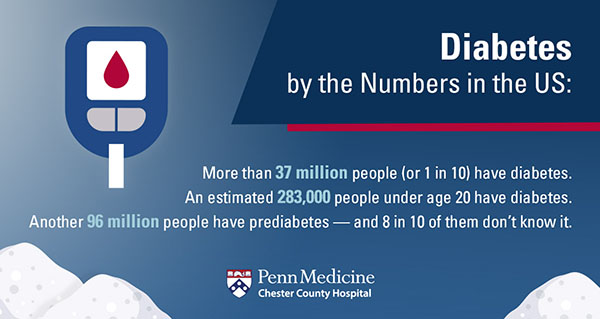5 Ways to Celebrate Halloween -- and Not Spike (or SPOOK!) Your Blood Sugar
October 18, 2023

Halloween is all about the fear factor, but that doesn't mean you have to hide if you have diabetes. Yes, candy is a central theme on the main day, but there are lots of ways to incorporate the spirit of the holiday and the spoils of trick-or-treating into your daily life, even if you have concerns about high blood sugar.

 "Maybe you’re a parent navigating Halloween with your child who has diabetes, or you might have diabetes yourself and feel tempted by all the sweets," says Michele Francis, MS, RD, CDCES, LDN, Director, Community Health & Wellness Services at Chester County Hospital. "Either way, you don’t have to dread it. But a shift in your focus might be necessary."
"Maybe you’re a parent navigating Halloween with your child who has diabetes, or you might have diabetes yourself and feel tempted by all the sweets," says Michele Francis, MS, RD, CDCES, LDN, Director, Community Health & Wellness Services at Chester County Hospital. "Either way, you don’t have to dread it. But a shift in your focus might be necessary."
Here are 5 ways to enjoy Halloween while lowering the blood sugar scaries:
- Trade your child's Halloween candy for cash or prizes. If your child is super motivated by the Tooth Fairy, use Halloween as another lesson in money. Or find a gift you know your child will love. Either way, offer a trade that they can't resist -- and that maintains the Halloween spirit.
Taking something away creates a feeling of missing out on something or punishment. But a trade creates positive memories and something that feels equal to or even better than the initial experience.
- Hand out something other than candy. On the day of trick-or-treating, pick a non-food item so the leftovers don’t tempt you or your child. Non-candy trick-or-treat options include:
- Stickers
- Festive pencils
- Erasers
- Temporary tattoos
- Bubble sticks
Also, be aware that homes that place out a teal pumpkin are signaling that they have something other than candy available for treats. This gives all children with dietary restrictions -- from diabetes to food allergies — options other than candy when they come knocking.
- Control your portions. Saying no to candy altogether creates a scarcity mindset and may encourage your child (or yourself!) to sneak around the rule. Instead, focus on your favorites using fun-size or smaller versions of larger candies.
Prohibiting sweets tends to make them even more tempting. Allow them, but set boundaries around portion control, and make sure you're still monitoring blood sugar levels.
- Host a Halloween spirit event. A costume party, craft day, pumpkin carving, or decorations walk can all help you get into the Halloween spirit since it focuses on festivities rather than candy. Get creative and include prizes for best costume, and check social media for seasonal craft ideas like papier mache pumpkins, tissue paper ghosts, and cardboard haunted houses. If you go on a neighborhood decorations walk — which comes with the added bonus of exercise — vote for your favorites, or create a scavenger hunt in advance.
This approach really captures the social aspect, which is a key part of Halloween and any holiday really. You won’t feel left out if you’re creating the fun.
- Don't lose yourself in the excitement. No matter how your Halloween plays out, take solace in your routine. Make sure you or your child is still getting lots of physical exercise and eating healthy beyond the candy.
Holidays shake up our routines, so use Halloween as a practice to prepare for other upcoming holidays, including Thanksgiving. Give yourself some leeway, but try to keep true to or make room for the healthier part of your day.
When you're tracking blood sugar levels, every day comes with its challenges. Halloween is no exception. Try not to feel daunted by the pressure, and instead turn it into an opportunity to find other forms of fun.
More Info About Regulating Your Blood Sugar
Live it up this Halloween season -- and keep blood sugars down. If you still have questions about managing diabetes on holidays, click here to learn about Chester County Hospital's certified Diabetes Management Program.